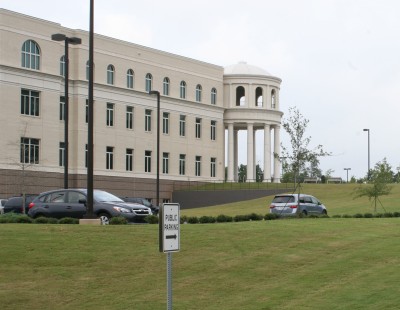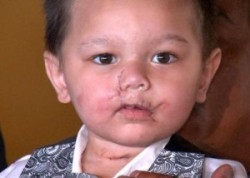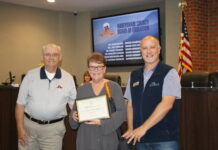

A Habersham Grand Jury, on Monday, found no basis for criminal charges against law enforcement in regards to a May 2014 residential drug raid in Cornelia that resulted serious injury to 19-month-old Bounkham “Bou Bou” Phonesavanh, who was sleeping inside the home at the time of the raid. Jurors did, however, include in their 16-page report several recommendations and numerous observations about the specific incident and drug investigations in general.
“To date, we are the only body of citizens who have heard all of the evidence and all of the facts rather than only portions of it,” stated jurors. “We have worked hard to attempt to make findings and recommendations that will actually have a positive impact on safety for both law enforcement officers and citizens.

During the six-day grand jury session, jurors reviewed and listened to recordings of interviews conducted by the Georgia Bureau of Investigation (GBI) and Federal Bureau of Investigation (FBI) as part of the investigation into the incident. The were given an in-person demonstration of the flash grenade distraction device employed during the drug raid and reviewed photographs of the scene of the incident. They viewed investigation reports, judicial rulings and statements made by members of the Phonesavanh family. In addition, they received live testimony from multiple individuals, including Habersham County Sheriff Joey Terrell, Mountain Judicial Circuit District Attorney Brian Rickman and the assistant district attorney and the district attorney office’s drug prosecutor. Jurors also heard testimony from District Attorney of the Coweta Judicial Circuit of Georgia, Peter J. Skandalakis, who was requested by Rickman to provide an independent review of the investigation.
In the grand jury’s closing presentment and report, jurors stated they hoped their findings would have an impact beyond the specific case.
“We the grand jury have examined closely and in detail all of the events regarding the drug investigation, the securing of a search warrant, the decision to contact Habersham’s Special Response Team (SRT), the briefings that took place, the planning, the procedure, and the events that led to a search warrant being executed and a child being seriously injured,” they stated. “Based upon our work, we make the following findings and recommendations not only for our community, but to the extent that others can learn from this tragedy. We … hope that by making findings and recommendations, and taking the actions that we will take, perhaps all of this needless suffering on all fronts can be avoided in our community and in other communities somewhere else.”
The grand jury, in their presentment, instructed the District Attorney’s office to forward copies of the document to the Georgia Sheriff’s Association and the Georgia Association of Chiefs of Police for their review and possible training guidance. They also requested the document, in its entirety, be read before the Georgia General Assembly.
Drug Investigations
Calling the investigation that led to the injury of Bounkham Phonesavanh “hurried” and “sloppy,” jurors stressed the vital need to protect public safety while in the pursuit of enforcing drug laws.
“While no members of this grand jury condones or wishes to tolerate drug dealers and the pain and suffering that they inflict upon a community, the zeal to hold them accountable must not override cautious and patient judgement,” they stated in the jury report. “Some of what contributed to this tragedy can be attributed to well-intentioned people getting in too big a hurry, and not slowing down and taking enough time to consider the possible consequences of their actions.”
Planning, caution and careful adherence to strict procedures and policies are vital in these situations, jurors said, adding they were pleased, as a group, with the recent decision of local law enforcement to work more closely with the GBI and follow a more standardized, professional drug enforcement model.
“We want drug enforcement that is focused on long term and upper level dealers and (which) is patient, cautious, and thorough,” they stated, adding that there should be “no such thing as an ‘emergency’” in drug investigations.
“While we as a community want drug dealers held to account, no seizure of evidence or apprehension of a criminal for a drug offense warrants anything but caution and careful planning,” they stressed. “There is an inherent danger to both law enforcement officers and to innocent third parties in many of these situations. The hard work and effort brought to apprehend suspects and seize evidence must always be tempered by the realization that no amount of drugs is worth a member of the public being harmed, even if unintentionally, or a law enforcement officer being harmed.
The following recommendations regarding drug investigations were proposed by the grand jury:
- During the entire investigation process, from gathering information to obtaining and serving search warrants, “it should be assumed that children are present unless strong evidence suggests otherwise.”
- Additional training should be required for any law enforcement officer whose duties include issuing legal documents such as search warrants.
- Officer training specifically in areas of maintaining composure and diffusing and de-escalating such situations should be mandated.
- Policy makers should consider whether “no-knock” warrants that are deemed higher risk should be approved only by superior court judges.
- First aid kits should be included in standard SRT gear, and coordination of first-responder units is recommended. On this matter, jurors commended the involvement of first responders in the May incident. “The grand jurors wish to praise the quick actions of the two officers with paramedic training and the foresight of the SRT commander to make available an ambulance in case of injuries,” the report states.
- Additional funding, as reasonable, should be made available by the Habersham Board of Commissioners for additional quality training for county law enforcement. “It is the opinion of the grand jurors that the minimum 20 hours of training that is required by the State of Georgia should only be a floor and not a ceiling,” jurors said.
- Specifically pointing out that the distraction device used during the incident was a “mini-bang” and not the larger available device, jurors nonetheless recommended that certification and re-certification of law enforcement officers using distraction devices such as flash bang grenades should be required by law instead of regulated only by policy and procedure.
- Drug case suspects should, when reasonably possible, be arrested away from home. “Going into a home with the highest level of entry should be reserved for those cases where it is absolutely necessary. This is to protect both citizens and law enforcement officers,” jurors stated.
Law enforcement actions
In addressing the conduct of officers and supervisors involved in the incident, jurors found no criminal actions or intent, but did point out several concerns.
“We the grand jury do not presume to fully understand the danger and stresses law enforcement officers constantly encounter while serving the public, but all efforts should be made, regardless of the circumstance, to maintain composure and professionalism so that such dangerous and stressful situations are not escalated by an officer’s poor conduct,” jurors stated, adding that the actions of one officer specifically were detrimental to the situation.
“We also heard evidence that one agent failed to appropriately act calmly when interacting with the father of the baby. In this emotionally charged situation, the agent should have calmed the situation rather than screaming, even when faced with an understandably upset and irate person.”
The grand jury report stated that this specific agent “is no longer at the drug unit, and will likewise have no role in the new GBI-supervised endeavor.”
Jurors also noted that they “recognize the failures of the supervising agent in providing adequate supervision and direction to the case agent.”
In regards to personnel actions taken as a result of the incident, the report discusses the timing and procedure for release of information about the investigation into the incident to different agencies and individuals, such as informing Sheriff Joey Terrell and other agency superiors about findings of the investigation. The report then addresses the actions of three specific individuals and the resulting personnel actions – the case agent, the case agent’s supervisor, and the agent who interacted inappropriately with the father of the child during a heated exchange.
- The case agent was placed on administrative leave immediately after investigative findings were reported to Sheriff Joey Terrell. The agent subsequently resigned in lieu of possible termination.
- The supervisor was reassigned and took a “fairly significant reduction in salary.”
- The agent who entered into an altercation with the father of the infant was reassigned and not allowed to apply for any role in drug investigations in Habersham County.
Death threats and safety
The grand jury elected to not name any individual members of the SRT in the report and presentment.
“The grand jury has decided that, due to serious and numerous death threats that have been made to multiple persons involved in this situation, we have not named specifically the individuals referenced in this report,” they stated. “We have been made aware that their names will, of course, at some point become public, but have chosen not to provide the names and give the foolish, ridiculous and potentially dangerous persons making such threats an easier time of continuing to commit such acts and further taint this process.”
SRT policy and procedures
Regarding the Habersham SRT, jurors recommended a “complete review of all policies and procedures.”
Additionally, jurors stated “We can make no finding that Habersham’s SRT did not have sufficient policies in place, and make no finding that we can determine any policy was violated,” the report states. “However, we think it would be wise to consider the already-existing policies and procedures of the Georgia State Patrol Team.”
Assessing, in the midst of an investigation, the presence of children should be a priority, jurors said.
“The evidence we heard did not reveal that nobody bothered to ask and inquire about the presence of children; indeed, there is evidence that questions were asked. However, when more can be reasonably done, it should be, including surveillance and records checks,” jurors stated.
Benchmarking Georgia State Patrol SRT policies
Jurors specifically referenced the following GSP policies, identifying them as recommended policies and procedures for the Habersham SRT to adopt.
Sufficient training concerning conducting drug search warrants at night.
An adequate amount of SRT mock raids conducted at night, “including scenarios where a flash bang device would be appropriate or inappropriate, with an emphasis concerning ‘line of sight’ and ‘no-bang’ situations.”
Civilian actions
Jurors also addressed the incident in regards to actions by those involved that were not part of the SRT, and determined that there was no basis for criminal charges, but that those actions and decisions played a role in the outcome of the drug raid.
“The evidence shows the children (Bounkham and his sisters) were in danger from the moment they moved into the residence and the parents and extended family had some degree of knowledge concerning family members involved in criminal activity that came in and out of the residence,” jurors stated.
“There is no available evidence that shows that the parents of the child participated in drug sales at the residence. There is evidence that they were aware of criminal activity and drug sales on the part of persons at the residence.
Additionally, jurors found sufficient cause to support the application and granting of a “no-knock” warrant.
“The evidence shows that Wanis Thonetheva was on bond for drug and gun charges. He also had a previous weapon charge. In addition, there had been a previous incident at the residence in 2013 where it was said that either an assault rifle or a replica of an assault rifle was involved in a robbery,” states the report. “Based on this evidence, we cannot say that seeking the “no knock warrant” was unjustified.”
Concluding the report, jurors stressed the importance of learning from the incident.
“The way to avoid tragedies such as this on in the future is to learn from them. The easiest way for a tragedy to repeat is not to learn from it” they stated. “The grand jurors hope and pray for a full recovery for baby Bou Bou and for the entire family, including the other children impacted.”







